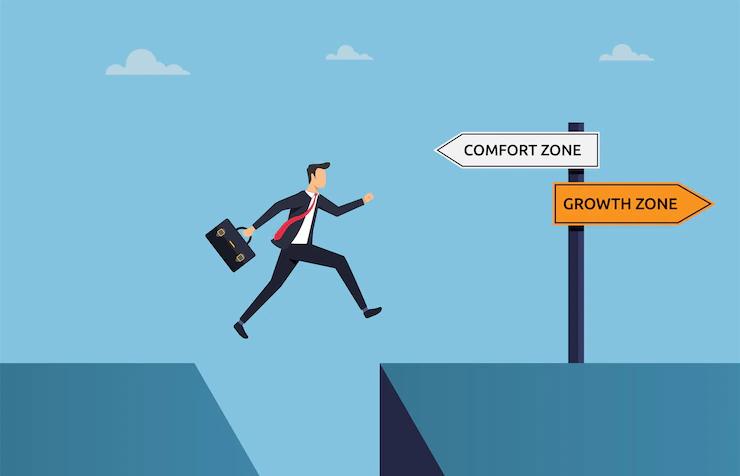
Don’t Just Stay In Your Comfort Zone – Work To Expand It!
We all have our own “comfort zone”, which is more than just a safe place, but rather a psychological, emotional state. A comfort zone is defined by several features such as familiarity, safety, and security. And when we are in our comfort zone, we feel calm and comfortable while being free from any form of anxiety and stress. Creating a comfort zone is a healthy necessity for much of our lives, but so is stepping out of our comfort zone when it’s time to transition, and grow. Photo credit: Freepik
Written by Elisa Pinton
The comfort zone, as defined by Lifehacker, is a “behavioral space where your activities and behaviors fit a routine and pattern that minimizes stress and risk”. When we step outside of our comfort zone, we’re taking a risk, and therefore opening ourselves up to the possibility of feeling stress and anxiety. It’s the idea that we don’t have control anymore and as a consequence we’re not quite sure what will happen next and how we will react.
Why are we instinctively drawn to our comfort zone ?

We are naturally drawn towards comfort and safety, which are basic human instincts. Sometimes of course it is healthy and beneficial for us to be within this space, but at the same time there is a possibility that we could be craving learning and new experiences at some point. Photo credit: Freepik
There are three main reasons that could explain why it is so difficult for us to leave this space.
First, your brain is busy. It consumes a ton of energy everyday because it has access to a lot of information, therefore it is always occupied. And because your brain is always working, it doesn’t allow time for you to try new things and challenge yourself.
Secondly, your brain is lazy. It doesn’t know the difference between a good new habit and a bad new habit, so naturally your brain will encourage you to do what you’ve always done, which is the easier option because you are used to doing it. This therefore pushes you to stay inside your comfort zone.
And finally, your brain wants to keep you safe. Humans are built to live in a world where we have everyday threats to our survival. Humans are creatures of comfort. Our comfort zone is our natural, neutral state, a place where stress and anxiety are minimal, where we know what’s coming next and we can anticipate what could happen and how we will react. Therefore, your brain wants to keep you safe by preventing any new and unknown situations.
5 huge benefits of stepping out of your comfort zone:
#1 – Your “real life” is waiting for you. It’s filled with all the experiences that make up your life, and it’s not limited to the things that make you feel good and comfortable.
#2 – Experiencing challenges pushes you to step outside of your comfort zone and explore all the possibilities available to you. By challenging yourself, you explore and learn what you are actually made of – you have so much knowledge and potential that are just hidden.
#3 – Even if you make mistakes, or if you don’t get it right the first time, learning from them will allow you to take advantage of these experiences in the future. It is by taking risks, regardless of the outcome, that you learn and grow. And even if you take a risk and it doesn’t work out, at least you have tried, and you will know how to do things better in the future. To think of the word “Fail“ in another way, imagine it as a shortcut for “First Attempt in Learning.“ Keep in mind: you never lose, you always learn.
#4 – Don’t settle for the mediocre just to avoid stepping out of your comfort zone; it’s too big a price to pay. Your challenges and risk experiences are cumulative. Every time you try something new, and allow yourself to be open to whatever experience arises, you are learning, and expanding your repertoire of life skills and self-knowledge. As you do this you also expand the size of your comfort zone.
#5 – In the long term, leaving your comfort zone will help you to deal better with change and confront the unknown. Each time you transition you move to another level. Inevitably, those lifestyle transitions remodel you because you will do something new and different and therefore you will get access to a whole other level.
If there is something you should remember, it would be what John Gardner, the author of Self-Renewal, says about stepping out of your comfort zone. “We pay a heavy price for our fear of failure,” says Gardner. “It is a powerful obstacle to growth. It assures the progressive narrowing of the personality and prevents exploration and experimentation.” There is no learning without some difficulty and fumbling. If you want to keep on learning, you must keep on risking failure — all your life. It’s as simple as that.”

Now that you have all the informations, your next step is just to take actions! Photo credit: Freepik

